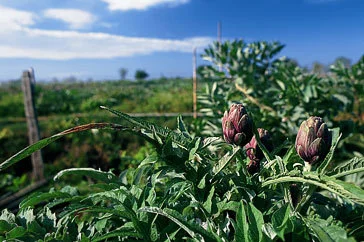Artischocken - Konzentrat ist eine Überlegung wert* Artichoke-concentrate is worth a thought*
Image internet
Artischocken - Konzentrat
- kann Cholesterin senkend wirken
- hilft gegen Völlegefühl
- kann entgiftend wirken
- lindert Blähungen
Wirklich wirksam sind die Artischockenblätter. Und zwar die, die sich am Grund des Stängels befinden, nicht die am Blütenköpfchen befindlichen Hüllblätter, die als schmackhaftes Gericht dienen. Artischockenblätter enthalten zu etwa 0,5 Prozent Flavonoide, vor allem die Substanz Luteolin, und deren Verwandter, das Cynarosid. Zu 0,02 bis zwei Prozent finden sich Caffeoylchinasäure-Abkömmlinge in den Blättern. Des Weiteren bis zu vier Prozent Bitterstoffe, zum Beispiel den Pflanzeninhaltsstoff Cynaropikrin.
Bitterstoffe wie das Cynaropikrin bewirken, dass sich mehr Magensäure bildet. Sie regen damit den Appetit an. Flavonoide und Caffeoylchinasäure-Abkömmlinge steigern die Produktion von Gallensäuren in der Leber und regen die Gallenblase dazu an, mehr Gallensäuren in den Darm abzugeben. Dort erleichtern sie die Verdauung von Fetten. Außerdem legen wissenschaftliche Untersuchungen nahe, dass die Artischocke die Lebertätigkeit unterstützt und sich günstig auf den Cholesterinspiegel auswirkt und entgiftend wirk.
Extrakte aus Artischockenblättern helfen aufgrund dieser Wirkungen bei mangelndem Appetit, lindern Blähungen und vermindern Völlegefühl – dies insbesondere nach einer fettigen Mahlzeit.
*Artichoke-concentrate
- can lower the cholesterol-level
- can reduce sensations of abdominal fullness
- can have de-toxifying effects
- alleviates flatulence
Truly potent are only the leafs of the artichoke, particularly those at the bottom of the stem, not the husks situated at the flower head which are a tasty dish. The artichoke-leafs contain about 0,5 percent flavonoids, especially the substance luteolin as well as their relative cynaroside. Also contained in the leafs are 0,02 – 2 percent caffeoylquinic acid. Furthermore up to four percent bitter constituents, for example the herbal agent cynaropicrin.
Bitters like cynaropicrin are responsible for a heightened production of gastric acid. This quickens the appetite. The descendants of flavonoids and caffeoylquinic acid stimulate the production of bile acids within the liver, again stimulating the gall-bladder to emit more bile acid to the intestines where they facilitate the digestion of fat. Furthermore, scientific research suggests that artichokes boost the activity of the liver, have a positive effect on the cholesterol-level as well as detoxifying effects.
Extracts of artichoke-leafs for this reason can be used in cases of low appetite, flatulence and abdominal fullness – especially after a greasy meal.*

